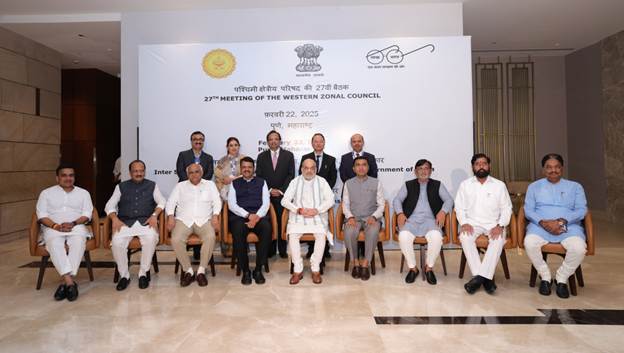Pune: Union Home Minister and Minister of Cooperation Amit Shah chaired the 27th meeting of the Western Zonal Council in Pune, Maharashtra, focusing on key regional issues, economic development, and governance reforms. The meeting saw the participation of Chief Ministers of Maharashtra, Gujarat, and Goa, the Administrator of Dadra and Nagar Haveli and Daman and Diu, Deputy Chief Minister of Maharashtra, senior officials from the central and state governments, and representatives from various ministries.
In his address, Amit Shah highlighted how zonal councils, though advisory in nature, have evolved into dynamic platforms for sharing best practices, resolving long-standing issues, and fostering holistic regional development. He credited Prime Minister Narendra Modi’s “Whole of Government” approach for transforming the councils into effective decision-making bodies that drive meaningful change and policy innovation.
Shah emphasized the strategic and economic significance of the Western region, stating that it contributes 25% of India’s GDP and handles over half of the country’s trade. He noted that the region’s infrastructure, including major ports and urban development projects, serves not just the western states but also Northern and Central India, including Jammu & Kashmir, Madhya Pradesh, and Rajasthan. Given its economic importance, he described the Western region as a benchmark for balanced and holistic national development.
The Home Minister highlighted the significant increase in Zonal Council meetings under Prime Minister Modi’s leadership. From 2004 to 2014, only 25 meetings were held, whereas from 2014 to 2025, despite the COVID-19 pandemic, 61 meetings have been conducted—a 140% increase. He also pointed out that 1,541 issues were discussed in the last decade compared to 469 in the previous decade, and 1,280 cases have been resolved, showcasing the government’s commitment to effective governance and resolution of regional challenges.
During the meeting, 18 key issues and six matters of national importance were discussed, covering a wide range of governance and development aspects:
- Infrastructure and Banking Accessibility: Shah announced that the government has almost achieved the goal of providing banking services within 5 km of every village and is now targeting a 3 km radius to ensure better financial inclusion.
- Addressing Malnutrition and Stunting: He expressed concern over child malnutrition and stunting in the Western states and urged them to prioritize health and nutrition initiatives under the Poshan Abhiyan.
- Education and School Dropout Rates: The Minister called for urgent measures to reduce dropout rates and enhance the quality of education, ensuring better learning outcomes for students.
- Boosting Domestic Pulse Production: Shah emphasized reducing India’s reliance on imported pulses and urged Western states to promote government-backed mobile apps that enable farmers to sell directly at Minimum Support Price (MSP).
- Strengthening Cooperative Sector for 100% Employment: Highlighting Prime Minister Modi’s “Sahkar se Samriddhi” vision, he stressed the need to strengthen Primary Agricultural Credit Societies (PACS) and implement 56 cooperative initiatives aimed at job creation and rural prosperity.
- New Criminal Laws and Cybersecurity Measures: He also underscored the importance of implementing three new criminal laws and announced that cybersecurity and digital infrastructure would soon be incorporated into Inter State Council discussions.
In his concluding remarks, Amit Shah hailed Pune as the cultural capital of India, acknowledging its rich historical and political significance. He commended Maharashtra Chief Minister Devendra Fadnavis for successfully hosting the meeting and ensuring smooth proceedings.





